Video Submissions
Re: Video Submissions
Stereoscopic encounter with the asteroid Ryugu (red-cyan anaglyph)
https://www.youtube.com/watch?v=M4nr6yzb0hA
https://www.youtube.com/watch?v=M4nr6yzb0hA
Re: Video Submissions
Stereoscopic visit of four cavities on the nucleus of comet 67P/Churyumov-Gerasimenko
https://www.youtube.com/watch?v=twsfRI52HZw
https://www.youtube.com/watch?v=twsfRI52HZw
Re: Video Submissions
Click to play embedded YouTube video.
To my knowledge, this is the highest resolution imagery of the solar
Full story and details here:https://philhart.com/exmouth-eclipse
Still images submitted here: viewtopic.php?p=337474#p337474
-
Alberto Vacca
- Asternaut
- Posts: 3
- Joined: Mon Feb 27, 2023 6:38 pm
Re: Video Submissions
HDR timelapse of partial lunar eclipse - 23/10/28
Copyright: Alberto Vacca
Description:
My aim was to represent the partial phase of the eclipse as I saw it from a binocular: the human eye has a really wide dynamic range so that the brightest and darker parts of the Moon are visible at the same time during the partial phase of the eclipse. Here is the HDR timelapse video of the eclipse:
The video is composed by 433 frames, taken every 24 seconds. The duration of the timelapse, 11 seconds, compared to the real time span of the shots, tells us that the video has been speeded up around 1000x. Every frame is an HDR union of 6 pictures taken within a wide range of different exposure times. I wrote a Python program to handle the processing of the whole sequence, taking into account the different brightness and color balance of the initial frames because of atmospheric extinction (the Moon was lower above the horizon). This way every frame has been processed in the same way with the same parameters, making it comparable with all other frames in terms of relative brightness.
The time of the shoot is: 2023 October 28, from 17:58 to 20:50 UT.
Location: Parma (Emilia Romagna, Italy), home garden.
Equipment:
- Tamron 100-400mm lens, used at 400mm
- Nikon D750 camera
- iOptron CEM40 equatorial mount
Software:
- APT (Astro Photography Tool) for acquisition
- Python program written by myself for processing
Copyright: Alberto Vacca
Description:
My aim was to represent the partial phase of the eclipse as I saw it from a binocular: the human eye has a really wide dynamic range so that the brightest and darker parts of the Moon are visible at the same time during the partial phase of the eclipse. Here is the HDR timelapse video of the eclipse:
Click to play embedded YouTube video.
The time of the shoot is: 2023 October 28, from 17:58 to 20:50 UT.
Location: Parma (Emilia Romagna, Italy), home garden.
Equipment:
- Tamron 100-400mm lens, used at 400mm
- Nikon D750 camera
- iOptron CEM40 equatorial mount
Software:
- APT (Astro Photography Tool) for acquisition
- Python program written by myself for processing
-
prashant_naik
- Ensign
- Posts: 26
- Joined: Thu Nov 07, 2019 2:26 am
Re: Video Submissions
StellaNova - A Journey to the stars
This week marks International Dark Sky Week, a time to appreciate the awe-inspiring beauty and vital role of a natural night sky. Unfortunately, light pollution increasingly obscures our view of the Milky Way, countless stars, and all the wonders the universe has to offer.
As a tribute to the dark sky, I'd like to share a video I created titled 'Stellanova' that captures the breathtaking beauty of a night sky. Take a moment to step outside, look up, and marvel at the stars. Together, let's preserve our precious night sky for future generations to enjoy. Happy stargazing!
https://youtu.be/eCEcL13nZKg
Date: Footages were shot during my travel between 2022 and 2023.
Equipments: Nikon D810, Nikkor 14-24mm
Post Processing: Raw files processed in Lightroom. Video transition and animation done in After Effects. Color correction, contrast and final adjustments done in Premiere Pro.
This week marks International Dark Sky Week, a time to appreciate the awe-inspiring beauty and vital role of a natural night sky. Unfortunately, light pollution increasingly obscures our view of the Milky Way, countless stars, and all the wonders the universe has to offer.
As a tribute to the dark sky, I'd like to share a video I created titled 'Stellanova' that captures the breathtaking beauty of a night sky. Take a moment to step outside, look up, and marvel at the stars. Together, let's preserve our precious night sky for future generations to enjoy. Happy stargazing!
Click to play embedded YouTube video.
Date: Footages were shot during my travel between 2022 and 2023.
Equipments: Nikon D810, Nikkor 14-24mm
Post Processing: Raw files processed in Lightroom. Video transition and animation done in After Effects. Color correction, contrast and final adjustments done in Premiere Pro.
Last edited by bystander on Thu Apr 04, 2024 10:40 pm, edited 1 time in total.
Reason: added full youtube url
Reason: added full youtube url
-
Naztronomy
- Ensign
- Posts: 14
- Joined: Wed Feb 09, 2022 3:31 pm
Re: Video Submissions
Full April 8, 2024 Total Solar Eclipse timelapse from start to finish. Taken from Richford, VT.
Click to play embedded YouTube video.
Re: Video Submissions
A comprehend total solar eclipse record:
Change of outer corona detail in 3 minutes, 4K resolution is recommended to see the differences:
A turbulence in the corona was falling back to the sun during the eclipse:
Click to play embedded YouTube video.
Change of outer corona detail in 3 minutes, 4K resolution is recommended to see the differences:
Click to play embedded YouTube video.
A turbulence in the corona was falling back to the sun during the eclipse:
Re: Video Submissions
Aurora display on May 10/11, 2024
Auroras caused by an extreme geomagnetic storm that began on May 10, 2024 where captured with sky surveillance cameras covering visible and infrared wavelengths.
Because this forum only allows to post videos hosted on vimeo or youtube (and I do not plan to open an account there), I post preview images here.
Click on them to go directly to the video.
RGB (true color) videos
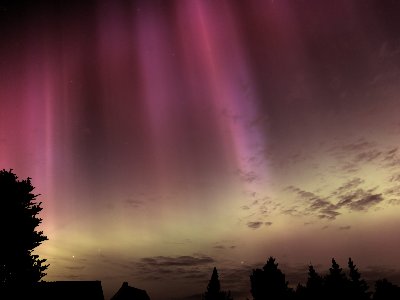
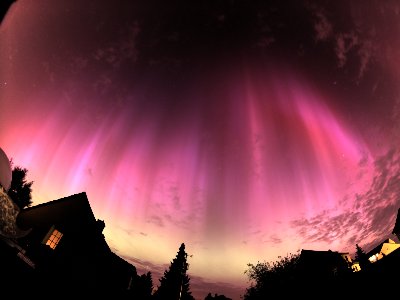
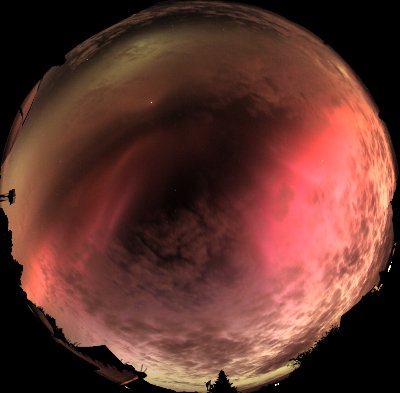
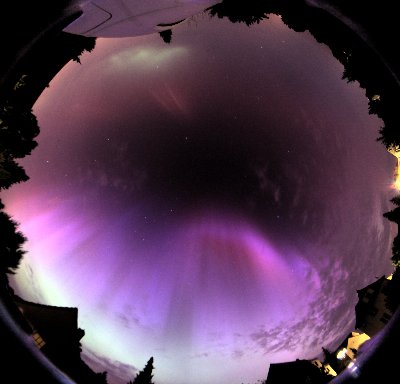
Near infrared (false color) videos
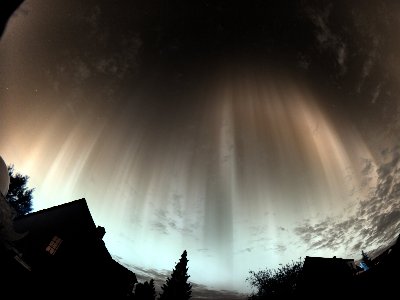
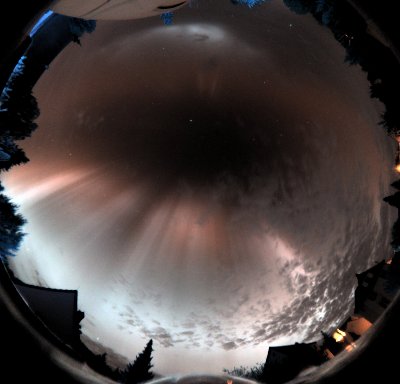
---
My Homepage
RSS news feed
Auroras caused by an extreme geomagnetic storm that began on May 10, 2024 where captured with sky surveillance cameras covering visible and infrared wavelengths.
Because this forum only allows to post videos hosted on vimeo or youtube (and I do not plan to open an account there), I post preview images here.
Click on them to go directly to the video.
RGB (true color) videos




Near infrared (false color) videos


---
My Homepage
RSS news feed
-
Fabrice JEAN
- Asternaut
- Posts: 1
- Joined: Mon May 13, 2024 10:45 pm
Re: Video Submissions
Hello!! Thanks for add. This is my first submission. aurora borealis from the region Lorraine in France.
https://youtu.be/sKE1JDIc0j4?si=WXBUbTqG9izlu2zu
https://youtu.be/sKE1JDIc0j4?si=WXBUbTqG9izlu2zu
Aurora and Thunder
The May 10th aurora was particularly interesting for me due to a thunderstorm in the distance, sadly I was only able to take 1h worth of exposures, and thus, the video is rather short, this is from 1h30 to 2h30, If only I could've been on site 2h early.
Click to play embedded YouTube video.
-
Guest
Re: Video Submissions
Last year in August, at the maximum of the Perseids, I had the opportunity to record some bright Perseids in real time.
Clear Skies, Helmut
https://stern-bild.at/
Clear Skies, Helmut
https://stern-bild.at/
- deepskyjourney
- Ensign
- Posts: 18
- Joined: Wed Feb 21, 2024 9:10 am
- Contact:
Re: Video Submissions
Visualisation: diving into the Pillars of Creation. Click the link to watch the video. Image provided as screenshot of the video.
https://www.instagram.com/reel/C-L6OvMy ... 1xZGFiOA==

https://www.instagram.com/reel/C-L6OvMy ... 1xZGFiOA==

-
prashant_naik
- Ensign
- Posts: 26
- Joined: Thu Nov 07, 2019 2:26 am
Re: Video Submissions
Nature's Own Light Show
On the night of August 12, a strong geomagnetic storm triggered spectacular display of Northern Lights which was visible as far south as Georgia. This concided with the Perseid Meteor shower reaching its peak with up to 90-100 per hour. It was an incredible opportunity to record this event. Perseid Meteors rained through the sky in a blazing display of celestial fireworks, leaving dust trails from the comet Swift-Tuttle. what made the night truly unforgettable was an unexpected geomagnetic storm that lit up the northern sky with a dazzling display of colorful auroras.
https://www.naikonpixels.com
Copyright: Prashant Naik
https://youtu.be/PAmMfUlWiTY?si=7ovBsvBimyalhZsg
On the night of August 12, a strong geomagnetic storm triggered spectacular display of Northern Lights which was visible as far south as Georgia. This concided with the Perseid Meteor shower reaching its peak with up to 90-100 per hour. It was an incredible opportunity to record this event. Perseid Meteors rained through the sky in a blazing display of celestial fireworks, leaving dust trails from the comet Swift-Tuttle. what made the night truly unforgettable was an unexpected geomagnetic storm that lit up the northern sky with a dazzling display of colorful auroras.
https://www.naikonpixels.com
Copyright: Prashant Naik
Click to play embedded YouTube video.
Last edited by bystander on Tue Aug 27, 2024 4:59 pm, edited 1 time in total.
Reason: Shortcut youtu.be can't be used with <youtube> tabs
Reason: Shortcut youtu.be can't be used with <youtube> tabs
-
Lopper
Re: Video Submissions
This is a timelapse video of an auroral display seen from southwest Ohio on the night of October 10, 2024. It was sparked by a severe (G4) geomagnetic storm.
Copyright: Matthew Lopper
https://youtu.be/kHllFs_xo-M
Copyright: Matthew Lopper
Click to play embedded YouTube video.
Last edited by bystander on Wed Oct 16, 2024 3:33 am, edited 1 time in total.
Reason: Don't use shortcuts. Use the full youtube url.
Reason: Don't use shortcuts. Use the full youtube url.
Re: Video Submissions
Real time 4K video - Aurora Borealis/Northern Lights peak activity 11th October 2024
The high activity segment of the aurora borealis peak, the event started on the night of the 10th October 2024 and peak activity was around midnight (so into the 11th) for half an hour when the solar activity was measuring approximately 1600nT, similar to the peak during the aurora of 10th May earlier in the year.
As we approach the sun's solar maximum, events like this will likely become more frequent and viewable further south in latitude (in the northern hemisphere) and further north (in the south hemisphere) as more sunspots develop on the sun's surface and eject Coronal Mass Ejections towards our planet.
https://youtu.be/TNzx4xbv9qw?feature=shared
The high activity segment of the aurora borealis peak, the event started on the night of the 10th October 2024 and peak activity was around midnight (so into the 11th) for half an hour when the solar activity was measuring approximately 1600nT, similar to the peak during the aurora of 10th May earlier in the year.
As we approach the sun's solar maximum, events like this will likely become more frequent and viewable further south in latitude (in the northern hemisphere) and further north (in the south hemisphere) as more sunspots develop on the sun's surface and eject Coronal Mass Ejections towards our planet.
Click to play embedded YouTube video.
Last edited by bystander on Wed Oct 16, 2024 3:35 am, edited 1 time in total.
Reason: Don't use shortcuts. Use the full youtube url
Reason: Don't use shortcuts. Use the full youtube url
Re: Video Submissions
22 minutes around the nucleus of a comet
As comet C/2023 A3 (Tsuchinshan-ATLAS) passes by, I'd like to take this opportunity to present my latest stereoscopic 3D film on the nucleus of a comet (release oct 24). This film gives you a detailed look at the product of predominantly solar erosion on the surface of a comet, as if you were in a spacecraft circling, approaching and landing on the comet.
The 3D reconstruction of small bodies is fundamental to the study of their physical properties, starting with their volume, which gives access to their density and thus to the formation processes. The study of their surfaces (and those of planets) and evolutionary processes requires quantitative data (height of cliffs, depth of basins, craters, wells, etc.). This is particularly the case for thermal modeling (energy received and integrated by the body) to determine lighting conditions. From an operational point of view, placing a vehicle on these surfaces (site selection) or operating a rover requires 3D reconstruction and stereo vision. To understand the overall shape of small bodies, we need to: understand accretion and evolution processes, know the gravity field (navigation aid). Geomorphological studies of terrestrial planets, asteroids and cometary nuclei require: a better understanding of the geological processes involved, information on internal structure, localized morphological studies at high spatial resolution, understanding of global and local topography, particularly slopes.
This work led to the publication of an article in the scientific journal Monthly Notices of the Royal Astronomical Society (MNRAS), Volume 531, Issue 2, June 2024, Pages 2494-2516, https://doi.org/10.1093/mnras/stae1290 “Detection and characterization of icy cavities on the nucleus of comet 67P/Churyumov-Gerasimenko” by Philippe Lamy, Guillaume Faury, David Romeuf, Olivier Groussin.
This study represents the first confirmation and characterization of SAPs (Subsurface Access Points) on a comet, i.e. cavities 20 to 47 m deep, with evidence of the presence of water ice. These cavities are areas of interest for a potential space probe that could gain direct access to the subsurface materials. We have also correlated the departure of a transient jet, linked to insolation at the bottom of one of these icy cavities, thanks to images and a 3D model associated with a thermal model.
If you want to learn more about the evolution of the comet's surface morphology, you can read this scientific article: “Surface Morphology of Comets and Associated Evolutionary Processes: A Review of Rosetta's Observations of 67P/Churyumov-Gerasimenko”.
https://doi.org/10.1007/s11214-019-0602-1
Watch it directly with the YouTube application on your 4K TV, in the evening in the dark and with the sound turned up to a powerful bass to fully appreciate Scott Buckley's music.
3D anaglyph red-cyan 4K version ***** the visual effect is very impressive : https://youtu.be/ztZ2d3laOQA
2D 4K version : https://youtu.be/RJYOGgD4bo4
As comet C/2023 A3 (Tsuchinshan-ATLAS) passes by, I'd like to take this opportunity to present my latest stereoscopic 3D film on the nucleus of a comet (release oct 24). This film gives you a detailed look at the product of predominantly solar erosion on the surface of a comet, as if you were in a spacecraft circling, approaching and landing on the comet.
The 3D reconstruction of small bodies is fundamental to the study of their physical properties, starting with their volume, which gives access to their density and thus to the formation processes. The study of their surfaces (and those of planets) and evolutionary processes requires quantitative data (height of cliffs, depth of basins, craters, wells, etc.). This is particularly the case for thermal modeling (energy received and integrated by the body) to determine lighting conditions. From an operational point of view, placing a vehicle on these surfaces (site selection) or operating a rover requires 3D reconstruction and stereo vision. To understand the overall shape of small bodies, we need to: understand accretion and evolution processes, know the gravity field (navigation aid). Geomorphological studies of terrestrial planets, asteroids and cometary nuclei require: a better understanding of the geological processes involved, information on internal structure, localized morphological studies at high spatial resolution, understanding of global and local topography, particularly slopes.
This work led to the publication of an article in the scientific journal Monthly Notices of the Royal Astronomical Society (MNRAS), Volume 531, Issue 2, June 2024, Pages 2494-2516, https://doi.org/10.1093/mnras/stae1290 “Detection and characterization of icy cavities on the nucleus of comet 67P/Churyumov-Gerasimenko” by Philippe Lamy, Guillaume Faury, David Romeuf, Olivier Groussin.
This study represents the first confirmation and characterization of SAPs (Subsurface Access Points) on a comet, i.e. cavities 20 to 47 m deep, with evidence of the presence of water ice. These cavities are areas of interest for a potential space probe that could gain direct access to the subsurface materials. We have also correlated the departure of a transient jet, linked to insolation at the bottom of one of these icy cavities, thanks to images and a 3D model associated with a thermal model.
If you want to learn more about the evolution of the comet's surface morphology, you can read this scientific article: “Surface Morphology of Comets and Associated Evolutionary Processes: A Review of Rosetta's Observations of 67P/Churyumov-Gerasimenko”.
https://doi.org/10.1007/s11214-019-0602-1
Watch it directly with the YouTube application on your 4K TV, in the evening in the dark and with the sound turned up to a powerful bass to fully appreciate Scott Buckley's music.
3D anaglyph red-cyan 4K version ***** the visual effect is very impressive : https://youtu.be/ztZ2d3laOQA
Click to play embedded YouTube video.
Click to play embedded YouTube video.
-
peterJaroslav
- Ensign
- Posts: 23
- Joined: Sun Jul 25, 2021 12:22 pm
Re: Video Submissions
Dynamics of a Comet's Tail
There has been thousands of spectacular images recently taken of Comet Tsuchinshan-Atlas and I have finally joined the party...all be it late!
Imaged on the 23 of October 2024 as it was setting in Spain. Image taken with The Takahashi 180 and asi2400mc pro.
When you compare this comet to many in the past it really does not appear to show a lot of structure...or that is what I thought! While doing the usual comet process I noticed quite a bit of detail showing through the tail and wondered if I was able to see any movement. Surprisingly the tail was pretty dynamic and was showing a coil of debris moving quite quicky down through the tail.
The animation is a timelapse of 29x 30s frames with a OSC camera. Please click the image to see the animation


https://www.astrobin.com/lzmigw/0/rawth ... c&animated
The comet at this stage still shows the 'antii' tail very nicely but significantly more diffused from a few days ago .

Thanks for looking
Peter Shah
There has been thousands of spectacular images recently taken of Comet Tsuchinshan-Atlas and I have finally joined the party...all be it late!
Imaged on the 23 of October 2024 as it was setting in Spain. Image taken with The Takahashi 180 and asi2400mc pro.
When you compare this comet to many in the past it really does not appear to show a lot of structure...or that is what I thought! While doing the usual comet process I noticed quite a bit of detail showing through the tail and wondered if I was able to see any movement. Surprisingly the tail was pretty dynamic and was showing a coil of debris moving quite quicky down through the tail.
The animation is a timelapse of 29x 30s frames with a OSC camera. Please click the image to see the animation


https://www.astrobin.com/lzmigw/0/rawth ... c&animated
The comet at this stage still shows the 'antii' tail very nicely but significantly more diffused from a few days ago .

Thanks for looking
Peter Shah
-
astrohokie
- Ensign
- Posts: 36
- Joined: Thu Oct 14, 2021 10:32 pm
Re: Video Submissions
Star Trail timelapse
Mark Hoffman
@mark_hoffman_photography
 Star trail timelapse by mark h, on Flickr
Star trail timelapse by mark h, on Flickr
Equipment/Capture Details:
Nikon Z8
Tamron 17-35mm
Exposure = 350 * 25sec
Interval = 1 sec
Aperture = f/10
ISO = 1600
Focal Length = 35mm
Processed in StarStax and Photoshop
@mark_hoffman_photography
Mark Hoffman
@mark_hoffman_photography
 Star trail timelapse by mark h, on Flickr
Star trail timelapse by mark h, on FlickrEquipment/Capture Details:
Nikon Z8
Tamron 17-35mm
Exposure = 350 * 25sec
Interval = 1 sec
Aperture = f/10
ISO = 1600
Focal Length = 35mm
Processed in StarStax and Photoshop
@mark_hoffman_photography
-
maphilli14
- Ensign
- Posts: 35
- Joined: Tue May 08, 2012 2:32 am
Re: Video Submissions
Jupiter animation in near excellent seeing
https://astromikephillips.wixsite.com/home
Copyright: Michael A. Phillips
https://astromikephillips.wixsite.com/home
Copyright: Michael A. Phillips
- deepskyjourney
- Ensign
- Posts: 18
- Joined: Wed Feb 21, 2024 9:10 am
- Contact:
Re: Video Submissions
Visualisation: Diving into the Helix Nebula
https://www.facebook.com/share/r/19ioFP ... tid=Mk4v2M
Snip of the video below. Link above to watch. Animation of an image I took of the Helix Nebula using Adobe AfterEffects. Original info and data below:
Title: Unlocking the Helix Nebula: A Journey Through Time and Tech
After capturing the Pillars of Creation in late July with my 90's scope - the Celestron Ultima 9-1/4 - I decided to turn my attention to the Helix Nebula (NGC 7293). This nebula is well-known for its complexity, and I quickly realized how challenging it would be to capture all of its intricate details at the native 2350mm focal length and slow f/10, as well as my bortle 6 skies. Still, I wanted to see what could be done by combining this classic equipment with modern technology.
The Challenge
The Helix Nebula’s delicate structure took a lot of effort to bring out. Using the ASI2600MM-Pro camera and Antlia 3nm narrowband filters, I spent more time than I'd like to admit refining the data to get the best result I could. It was tough, but I’m happy with how it turned out, showing that even older gear can still perform well with today’s tools.
Classic Meets Modern
Although the Helix Nebula has been photographed many times, this image is special to me because it highlights what’s possible when you combine equipment from different eras. It’s proof that with patience and persistence, classic telescopes can still capture some amazing views of the cosmos.
Tech Specs:
Dates:
July 29 - 31, 2024
Aug. 3 - 4, 2024
Aug. 6 - 8, 2024
Aug. 18 - 19, 2024
Frames:
Antlia 3nm Narrowband H-alpha 36 mm: 27×1000″(7h 30′) (gain: 100.00) f/10 -10°C bin 1×1
Antlia 3nm Narrowband H-alpha 36 mm: 39×300″(3h 15′) (gain: 100.00) f/10 -10°C bin 1×1
Antlia 3nm Narrowband H-alpha 36 mm: 33×600″(5h 30′) (gain: 100.00) f/10 -10°C bin 1×1
Antlia 3nm Narrowband Oxygen III 36 mm: 40×300″(3h 20′) (gain: 100.00) f/10 -10°C bin 1×1
Antlia 3nm Narrowband Oxygen III 36 mm: 32×600″(5h 20′) (gain: 100.00) f/10 -10°C bin 1×1
Baader Blue (CMOS-Optimized) 36 mm: 33×60″(33′) (gain: 100.00) f/10 -10°C bin 1×1
Baader Green (CMOS-Optimized) 36 mm: 33×60″(33′) (gain: 100.00) f/10 -10°C bin 1×1
Baader Red (CMOS-Optimized) 36 mm: 33×60″(33′) (gain: 100.00) f/10 -10°C bin 1×1
Integration Time:
26h 34′
Mount: Sky-Watcher Australia NEQ6-Pro
Camera: ZWO ASI2600MM-Pro
Bortle 6 skies in Hillcrest QLD, Australia.
HQ static image:
See it on Astrobin: www.astrobin.com/p3dy52/C/
All my socials: linktr.ee/deepskyjourney
Thanks.
Kind Regards,
Rod Prazeres Astrophotography
https://www.facebook.com/share/r/19ioFP ... tid=Mk4v2M
Snip of the video below. Link above to watch. Animation of an image I took of the Helix Nebula using Adobe AfterEffects. Original info and data below:
Title: Unlocking the Helix Nebula: A Journey Through Time and Tech
After capturing the Pillars of Creation in late July with my 90's scope - the Celestron Ultima 9-1/4 - I decided to turn my attention to the Helix Nebula (NGC 7293). This nebula is well-known for its complexity, and I quickly realized how challenging it would be to capture all of its intricate details at the native 2350mm focal length and slow f/10, as well as my bortle 6 skies. Still, I wanted to see what could be done by combining this classic equipment with modern technology.
The Challenge
The Helix Nebula’s delicate structure took a lot of effort to bring out. Using the ASI2600MM-Pro camera and Antlia 3nm narrowband filters, I spent more time than I'd like to admit refining the data to get the best result I could. It was tough, but I’m happy with how it turned out, showing that even older gear can still perform well with today’s tools.
Classic Meets Modern
Although the Helix Nebula has been photographed many times, this image is special to me because it highlights what’s possible when you combine equipment from different eras. It’s proof that with patience and persistence, classic telescopes can still capture some amazing views of the cosmos.
Tech Specs:
Dates:
July 29 - 31, 2024
Aug. 3 - 4, 2024
Aug. 6 - 8, 2024
Aug. 18 - 19, 2024
Frames:
Antlia 3nm Narrowband H-alpha 36 mm: 27×1000″(7h 30′) (gain: 100.00) f/10 -10°C bin 1×1
Antlia 3nm Narrowband H-alpha 36 mm: 39×300″(3h 15′) (gain: 100.00) f/10 -10°C bin 1×1
Antlia 3nm Narrowband H-alpha 36 mm: 33×600″(5h 30′) (gain: 100.00) f/10 -10°C bin 1×1
Antlia 3nm Narrowband Oxygen III 36 mm: 40×300″(3h 20′) (gain: 100.00) f/10 -10°C bin 1×1
Antlia 3nm Narrowband Oxygen III 36 mm: 32×600″(5h 20′) (gain: 100.00) f/10 -10°C bin 1×1
Baader Blue (CMOS-Optimized) 36 mm: 33×60″(33′) (gain: 100.00) f/10 -10°C bin 1×1
Baader Green (CMOS-Optimized) 36 mm: 33×60″(33′) (gain: 100.00) f/10 -10°C bin 1×1
Baader Red (CMOS-Optimized) 36 mm: 33×60″(33′) (gain: 100.00) f/10 -10°C bin 1×1
Integration Time:
26h 34′
Mount: Sky-Watcher Australia NEQ6-Pro
Camera: ZWO ASI2600MM-Pro
Bortle 6 skies in Hillcrest QLD, Australia.
HQ static image:
See it on Astrobin: www.astrobin.com/p3dy52/C/
All my socials: linktr.ee/deepskyjourney
Thanks.
Kind Regards,
Rod Prazeres Astrophotography